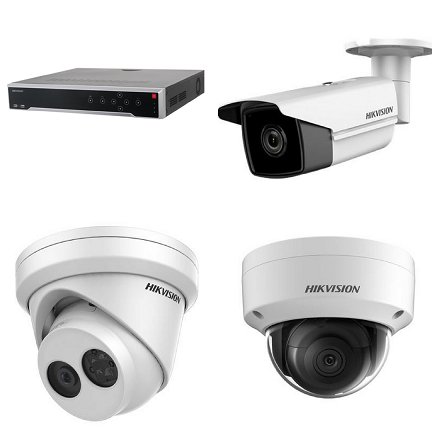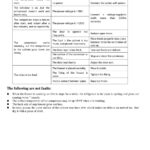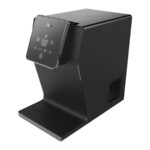CCTV cameras not working after a power cut often require a system reset. Check the power source and connections first.
Dealing with CCTV cameras that fail to operate post-power outage can be frustrating. Many homeowners and businesses rely on these surveillance systems for security. A sudden loss of functionality can compromise safety. The reasons behind this issue vary, from simple power supply problems to more complex system malfunctions.
Ensuring your CCTV system has a reliable power backup solution can mitigate such risks. Regular maintenance checks also play a crucial role in preventing unexpected downtimes. Understanding the common causes and solutions helps in quickly restoring your CCTV cameras to their full operational state. Taking proactive steps towards safeguarding your surveillance system will enhance its reliability and longevity, keeping your premises secure at all times.

Credit: www.pinterest.com
The Impact Of Power Cuts On Cctv Operations
The Impact of Power Cuts on CCTV Operations is significant. CCTV cameras play a vital role in security. They deter crime and provide evidence. But, power outages can disrupt their function. Let’s explore how these interruptions impact security systems.
How Power Outages Affect Security Systems
Power cuts immediately affect CCTV operations. Cameras stop recording without power. This results in security gaps. Here are key points to consider:
- No recordings: Without power, there’s no surveillance footage.
- Reset needs: Systems may need manual resets post-outage.
- Data loss: Ongoing recordings can be lost during outages.
Backup power solutions are essential. They ensure continuous operation during outages.
Consequences Of Cctv Downtime
Downtime impacts security and safety. It leaves areas vulnerable. Below are key consequences:
| Consequence | Impact |
|---|---|
| Security Risk | Criminals may exploit the lack of surveillance. |
| Loss of Trust | People depend on CCTV for safety. Downtime erodes trust. |
| Evidence Gaps | Investigations may suffer without footage. |
Regular system checks can minimize risks. Ensure backup power sources are reliable.
Common Reasons For Cctv Malfunction Post-power Cut
CCTV cameras play a crucial role in home security. A power cut can disrupt this security. Let’s explore common issues that cause CCTV malfunctions after a power interruption.
Electrical Surges And Cctv Circuitry Damage
Electrical surges are sudden spikes in voltage. These can happen when power returns after an outage. Surges can damage sensitive CCTV components. Cameras may stop working or behave erratically.
- Power strips can offer some protection.
- Invest in surge protectors to shield your system.
Battery Backup Failures
Many CCTV systems have battery backups. These should kick in during a power cut. Battery failures can leave cameras inoperable.
| Battery Issue | Sign | Action |
|---|---|---|
| Dead Batteries | No power to cameras | Replace batteries |
| Weak Batteries | Short runtime | Charge or replace |
| Corrosion | White residue on terminals | Clean terminals, consider replacement |
Troubleshooting Steps After A Power Outage
Power cuts can leave CCTV systems unresponsive. Knowing the right steps to troubleshoot can quickly restore security. Follow these simple troubleshooting steps to get your CCTV cameras back in action.
Initial Assessment Of The Cctv System
Check the power supply to your CCTV system first. Confirm that the power outage is over. Ensure other devices are working. Look at your CCTV system’s power indicators. No lights often mean no power.
Inspect all connections. Loose cables can disrupt power. Secure any disconnected wires. Ensure surge protectors are functional. They protect against power spikes.
Examine the DVR/NVR. Digital Video Recorders (DVRs) and Network Video Recorders (NVRs) store footage. They need power to operate. Check their status lights too.
Power Cycle The Cctv Equipment
Power cycling can fix temporary glitches. It restarts the system. Follow these steps:
- Turn off the CCTV equipment.
- Unplug devices from the power source.
- Wait for two minutes.
- Reconnect the power.
- Turn on the system.
Watch for the system to reboot. Check cameras for activity. This step often resolves power-related issues.
If issues persist, consult the manual. Contact support for help.
Preventative Measures For Cctv Systems
Keeping CCTV systems safe from power cuts is crucial. Here, we’ll talk about how to protect them. We focus on two main ways: using surge protectors and uninterruptible power supplies (UPS).
Installing Surge Protectors
Surge protectors keep CCTV cameras safe from power spikes. These spikes can happen after power cuts. They can break your cameras. A good surge protector stops this. It acts like a shield.
- Choose a surge protector with a high joule rating.
- Plug your CCTV system into the surge protector.
- Check the protector regularly to ensure it works.
This simple step can save your cameras from getting damaged.
Using Uninterruptible Power Supplies (ups)
UPS systems keep cameras running during power cuts. They give emergency power. This means your cameras keep recording without stopping.
- Pick a UPS with enough power for your system.
- Connect your CCTV cameras to the UPS.
- Test the UPS regularly to make sure it works.
With a UPS, your cameras stay on, even when the lights go off.
Understanding The Role Of Cctv Memory Storage
Understanding the Role of CCTV Memory Storage is crucial. After a power cut, your CCTV cameras might not work. This is often due to memory storage issues. CCTV memory stores video footage. It is like the brain of your CCTV system. Let’s dive into why this happens and how to fix it.
Data Corruption And Recovery Methods
Power cuts can lead to data corruption. This means the CCTV footage gets damaged. It might not play back correctly. Sometimes, it gets lost.
But, there are ways to fix this:
- Restart your CCTV system. This can help fix minor glitches.
- Use data recovery software. These programs can find and fix corrupted files.
- If these steps fail, contact a professional. They can often retrieve lost footage.
Cloud Vs Local Storage Solutions
Choosing the right storage is important. There are two main types:
- Cloud storage saves footage online. It is safe from physical damage. But, it requires a stable internet connection.
- Local storage saves footage on a physical device. This can be a hard drive or a memory card. It works without the internet. Yet, it can be damaged by power cuts or hardware issues.
Here’s a comparison:
| Storage Type | Pros | Cons |
|---|---|---|
| Cloud Storage | Safe from physical damage, Accessible anywhere | Needs internet, Monthly fees |
| Local Storage | No internet needed, One-time cost | Risk of damage, Limited space |
Choosing between cloud and local storage depends on your needs. Think about internet access, budget, and safety needs.
Professional Vs Diy Cctv Troubleshooting
Discovering your CCTV cameras not working after a power cut is frustrating. The decision to troubleshoot issues yourself or call in professionals depends on your expertise and the complexity of the problem. In this guide, we’ll explore both avenues.
When To Call In The Experts
- Complex system setups: Professionals handle intricate wiring with ease.
- Recurring issues: Experts diagnose persistent problems effectively.
- Warranty concerns: Preserve your warranty with expert repairs.
- Time constraints: Professionals fix issues quickly.
Guides For Diy Cctv Repairs
Simple fixes can often get your CCTV system back online. Follow these DIY steps:
- Check power sources: Ensure all cables are plugged in.
- Reset the system: A simple reboot may resolve the issue.
- Inspect connectors: Loose connections can disrupt the service.
- Review camera settings: Verify configurations are correct.
Always refer to your CCTV manual for specific troubleshooting steps.
Upgrading Your Cctv System For Better Resilience
Picture this: a sudden power cut hits, and your CCTV cameras go dark. The security of your home or business hangs in the balance. When power returns, your cameras don’t. It’s a common and frustrating issue. But there’s a solution. Upgrade your CCTV system to ensure it withstands power disruptions. Let’s explore features and equipment that offer better resilience.
Modern Cctv Features To Consider
Today’s CCTV technology offers advanced features for uninterrupted surveillance. Consider these:
- Battery backups keep cameras running during power cuts.
- Power over Ethernet (PoE) delivers power and data through one cable.
- Solar-powered cameras offer a green, reliable power source.
- Remote access allows you to check camera status from anywhere.
Investing In High-quality Equipment
Quality matters. High-quality CCTV cameras and components can mean the difference between security and vulnerability. Here’s why investing in better equipment is crucial:
| Feature | Benefit |
|---|---|
| Durable materials | Resist weather, wear, and tear |
| Top-notch sensors | Provide clear images, even in low light |
| Reliable brand | Ensures ongoing support and updates |
Remember, investing in your CCTV system is investing in safety. Choose wisely for peace of mind.

Credit: www.precisionsecurity.com.au
Legal And Insurance Considerations
Legal and Insurance Considerations are crucial when CCTV cameras fail after a power cut. Understanding the implications helps manage risks effectively. Let’s delve into the potential legal and insurance challenges you might face.
Liability When Security Fails
Security systems, including CCTV, deter crime and monitor premises. After a power cut, non-functioning cameras may leave a property vulnerable. Owners must assess risks and mitigate them promptly.
- Boldly document maintenance and backup solutions.
- Check system recovery procedures regularly.
- Ensure clear signage indicating CCTV presence.
This proactive approach reduces liability concerns.
Insurance Claims For Damaged Cctv Systems
Power surges can damage CCTV systems. Insurance policies may cover such incidents. Policyholders should:
- Review insurance terms for electronic damage.
- Report incidents to insurers swiftly.
- Keep detailed records of damage and repairs.
These steps ensure smoother claims processing.
| Action | Benefit |
|---|---|
| Maintain Records | Supports Insurance Claims |
| Regular Maintenance | Limits Liability |
| Immediate Reporting | Speeds Up Claim Resolution |
Long-term Solutions And Best Practices
When your CCTV cameras stop working after a power cut, it’s crucial to have long-term solutions and best practices in place. These strategies ensure the continuous operation of your security system. Implementing regular maintenance schedules and emergency preparedness plans are key.
Regular Maintenance Schedules
Regular checks keep systems functional. Neglect leads to unexpected failures. Schedule monthly inspections to prevent issues. Here’s a list of key tasks:
- Test backup batteries: Ensure they hold a charge.
- Clean camera lenses: Clear images are critical.
- Verify connections: Loose wires cause problems.
- Update software: Security features need current versions.
Stick to the schedule. Missed checks invite trouble.
Emergency Preparedness Plans For Security Systems
Emergency plans safeguard systems. A well-prepared strategy can handle power cuts gracefully. Consider these elements:
- Uninterruptible Power Supplies (UPS): Keep cameras recording.
- Surge protectors: Defend against power spikes.
- Generator support: For extended outages.
- Detailed recovery procedures: Restore operations quickly.
Train staff on these procedures. Everyone should know their role during an outage.

Credit: www.reddit.com
Frequently Asked Questions
Why Do Cctv Cameras Fail After Power Cuts?
CCTV cameras may stop working post-power cut due to a disruption in the electrical supply which can affect the cameras’ power source, causing them to reset or lose their configuration settings.
Can Power Outages Damage Cctv Systems?
Sudden power outages can potentially damage CCTV systems if they cause power surges upon restoration, which may overload and harm the cameras’ internal components.
How To Reset Cctv Cameras After Electricity Is Restored?
To reset a CCTV camera, typically disconnect it from power for a few minutes, then reconnect it. Check the manual for model-specific instructions, as procedures may vary.
What To Check If Cctv Isn’t Working After A Power Cut?
Check the power source, ensure cables are connected, inspect the DVR/NVR for issues, and verify camera functionality one by one to pinpoint the problem.
Is It Necessary To Have A Ups For Cctv Cameras?
Installing a UPS (Uninterruptible Power Supply) for CCTV systems is advised as it provides backup power during outages, ensuring continuous surveillance and preventing system reboots.
Conclusion
Experiencing a power cut can leave you feeling vulnerable, especially when it disrupts your CCTV security system. This post has equipped you with practical steps to troubleshoot and restore your cameras’ functionality swiftly. Remember, regular maintenance and a reliable backup power source are key to preventing future outages.
Stay secure and prepared, ensuring peace of mind in any power scenario.




